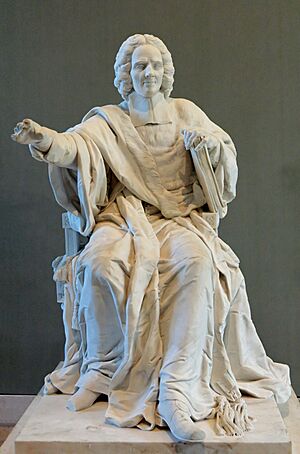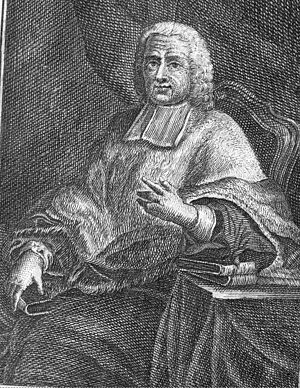Charles Rollin facts for kids

Charles Rollin (born January 30, 1661, in Paris – died December 14, 1741, in Paris) was an important French historian and educator. He is best known for his books on ancient history and his ideas about education.
Early Life and Career
Charles Rollin was the son of a cutler, which is someone who makes or sells knives and other cutting tools. He was very smart and became a master teacher at the Collège du Plessis when he was only 22 years old.
In 1694, Rollin became the head of the University of Paris, a very important position. He did a great job, especially by bringing back the study of the Greek language. He held this role for two years, which was longer than usual. In 1699, he was made the principal of the Collège de Beauvais.
Challenges and Religious Views
Rollin had strong religious beliefs, which were part of a group called Jansenism. These views caused him some trouble. He even supported stories about miracles happening at the tomb of a religious figure named François de Paris.
Because of his religious opinions, Rollin lost his teaching jobs. He was also not allowed to be the head of the university again, even though he was re-elected in 1719. It is also believed that his religious views stopped him from joining the famous Académie française, a group of important French writers and thinkers. However, he was a member of the Academie des Inscriptions, another respected academic group.
Just before he passed away, Rollin publicly spoke out against a church rule called the Unigenitus.
Major Works and Legacy
Rollin's most famous writings came later in his life, after he was no longer allowed to teach. His well-known book, Ancient History (called Histoire Ancienne in French), was published in 12 volumes between 1730 and 1738. He also started a Roman History (Histoire Romaine), but only finished five volumes before he died.
These history books were based on information from other sources. While they might not be perfectly accurate by today's standards, they were very popular and taught many generations of students about the past.
A more original and very important work by Rollin was his Treatise on Education (Traité des Études), published from 1726 to 1731. This book shared his ideas for a new and improved way of teaching. He wanted to move away from old medieval traditions in France. He believed in focusing on French history and using the French language in textbooks instead of Latin. Interestingly, Rollin himself did not start writing in French until he was 60 years old!
Rollin's work had a lasting impact on how history was taught and how schools were run in his time.
 | Tommie Smith |
 | Simone Manuel |
 | Shani Davis |
 | Simone Biles |
 | Alice Coachman |


